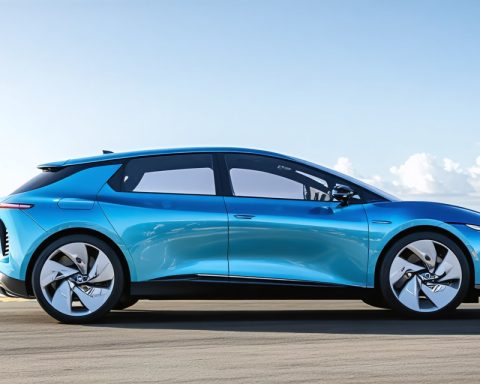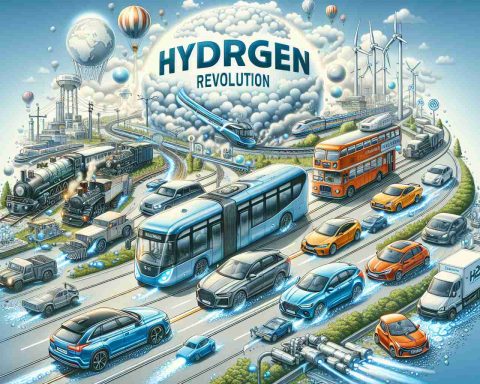The political landscape in the United States has shifted, igniting a heated discussion about the future of hydrogen energy. The unexpected triumph of Donald Trump in the recent presidential election has prompted experts to reconsider the direction of hydrogen development in the country.
Industry leaders foresee a shift towards blue hydrogen production, as opposed to the greener alternative, over the coming years. This prediction stems from a potential upheaval in energy policies introduced under the Democrat administration, notably the Inflation Reduction Act (IRA), which aimed to bolster renewable energy investment.
Murray Douglas, who leads hydrogen research at Wood Mackenzie, indicated that the election outcome could lead to profound changes in US policies. Speaking at a major hydrogen conference in London, he emphasized the potential risks under a Republican leadership, including the possible dismantling of current climate initiatives like the IRA.
Changes in trade regulations are also on the horizon, which could impact the import of energy technologies critical for advancing hydrogen initiatives. The prospect of new trade tariffs introduced by the Republican administration could pose significant challenges for international businesses and domestic energy projects.
With the political axis tilting, stakeholders are closely monitoring these developments. The evolving dynamics in Washington could reshape not only the hydrogen market but also broader energy strategies globally, as countries adjust their approaches in response to US policy shifts. As experts and markets brace for the changes, the debate over the optimal path for energy transition continues to intensify.
Could Green Hydrogen Be the Solution? Exploring the Energy Roadmap Behind the Headlines
As the world grapples with escalating climate concerns, the focus on sustainable energy intensifies, and hydrogen, particularly green hydrogen, emerges as a vital component of future strategies. While industry reactions to political shifts discuss the potential increase in blue hydrogen production, a lesser-discussed impact involves green hydrogen’s potential to revolutionize energy practices.
Green hydrogen, produced through electrolysis using renewable energy sources like wind or solar, offers a zero-emission alternative. This contrasts with blue hydrogen, which, although cleaner than fossil fuels, relies on carbon capture and has a higher environmental impact due to the initial natural gas usage.
Why Green Hydrogen Matters
The benefits of green hydrogen extend beyond its environmental credentials. Its production could bolster energy security by reducing reliance on natural gas imports, which were highlighted as a concern with changing trade regulations under shifting US policies. Communities could potentially see economic benefits through the creation of new jobs and industries focused on renewable technology.
Moreover, countries heavily invested in renewables, such as Germany and Australia, are making significant strides in green hydrogen investment. These initiatives not only aid in reducing carbon footprints but also offer a competitive edge in the burgeoning global hydrogen market. This international context highlights International Energy Agency‘s role in shaping policy and offers insights into strategic opportunities for US energy markets under differing political scenarios.
Why Not More Green Hydrogen Now?
The main hurdles lie in cost and infrastructure. Currently, producing green hydrogen is substantially more expensive than its blue variant, slowing its wide-scale adoption. Questions arise: Can technological advances bring costs down? And will government incentives, potentially reduced under leadership changes, be enough to spur necessary investment?
Despite these challenges, innovators believe that the green hydrogen pathway will become economically viable sooner rather than later. Experts suggest that with targeted subsidies and investments, akin to renewable energy successes seen in the solar and wind sectors, efficiency and cost-effectiveness are achievable.
The Global Chessboard of Energy Politics
International partnerships are becoming more critical. For instance, the European Union’s investment in green hydrogen projects could inspire similar endeavors, particularly as countries aim to meet ambitious net-zero targets. These geopolitical dimensions underscore energy transitions not only as environmental imperatives but as strategic economic objectives.
In a controversial twist, some environmentalists argue that a rush towards blue hydrogen locks infrastructure into fossil fuel dependency. This debate underscores the necessity for transparent policymaking and investment in truly sustainable solutions rather than temporary diversions.
The Road Ahead
The future of hydrogen energy, particularly the role of the US, remains uncertain, but the global implications are unmistakable. Stakeholders from energy conglomerates to governmental bodies must venture cautiously in navigating this rapidly evolving landscape.
Inquiring minds will continue probing: Can green hydrogen truly make economic sense without policy support? And, more critically, as policy directions sway, will commitments to a sustainable energy transition endure?
Stay up to date with breakthroughs and policy shifts in the energy sector at U.S. Department of Energy and join the conversation about the future of clean power.














